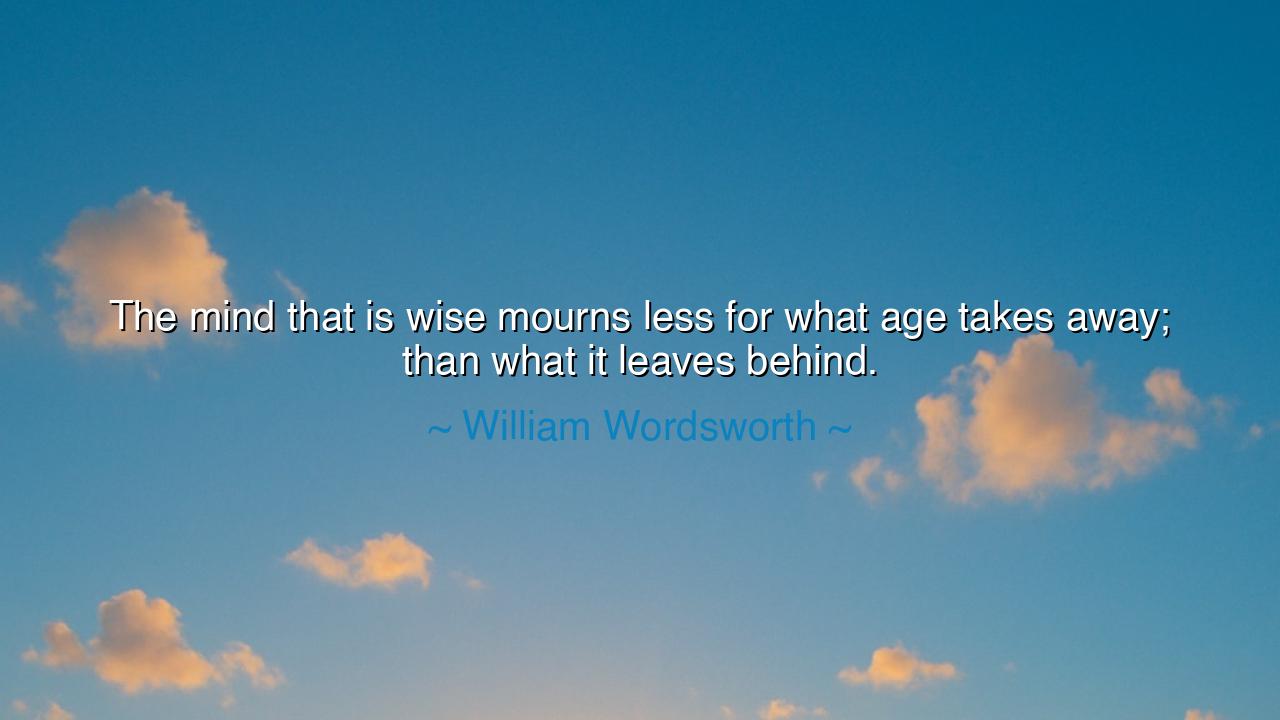
The mind that is wise mourns less for what age takes away; than






“The mind that is wise mourns less for what age takes away; than what it leaves behind.” — William Wordsworth
Thus spoke William Wordsworth, the poet of nature and of the human soul, whose verses flowed like rivers through the valleys of thought. In this meditation upon age, he reminds us that time is not merely a thief of youth, but a mirror revealing what remains when all illusions fade. The wise mind, he says, does not weep for the passing of strength, beauty, or vigor — those gifts that youth so proudly wears — but rather grieves for the remnants of vanity, folly, and unlearned wisdom that age cannot entirely cleanse away. The sorrow of the wise is not for the body that weakens, but for the spirit still unpurified.
To the unreflective, aging seems a slow loss — the dimming of eyesight, the trembling of hands, the fading of laughter’s echo. But Wordsworth, in the stillness of his mature years, looked deeper. He saw that the passing of time, if rightly embraced, strips us not of life but of illusion. The gifts of youth — passion, speed, strength — are bright, but fleeting. The gifts of age — clarity, peace, humility — are eternal, but dearly bought. The wise one accepts this trade with gratitude. Yet even wisdom cannot fully protect us from mourning what remains in us that should have died long ago: pride, fear, anger, regret. It is this inner residue, these unmastered parts of ourselves, that Wordsworth calls us to lament.
In his later years, Wordsworth had withdrawn from the fiery passions of his youth — from the radical idealism that once moved him to celebrate revolution and freedom. He had learned, through disappointment and reflection, that the true revolution is not fought in the streets, but within the soul. When he wrote these words, he had already seen much of life’s change: the deaths of friends, the decline of health, the transformation of the self. Yet he also saw how much remains untouched by time — the stubborn ego, the lingering attachments, the unyielding fears. The wise mourn not their wrinkles, but their clinging to what should have been surrendered.
The ancients, too, knew this truth. The philosopher Seneca wrote that age is not the enemy but the revealer — it shows the soul as it truly is, stripped of pretense. He warned that many grow old, but few grow wise. For when youth’s fire has cooled, the heart’s impurities rise to the surface like sediment in still water. Thus, the one who has not practiced self-mastery in youth finds bitterness instead of peace in old age. The unwise mourn the body’s decline; the wise, the spirit’s unfinished work.
Consider the example of King Lear, the ancient monarch of Shakespeare’s tragedy. Lear had age but not wisdom; power but not vision. When time stripped him of his throne, what was left behind was his pride, his blindness, his desperate need for validation. His sorrow was not for what the years had taken — his youth, his kingdom — but for what they revealed he had always lacked: humility and love. It was only through suffering, when he was emptied of all outward glory, that he finally beheld truth. This, too, is the lesson of Wordsworth: that age does not destroy us — it exposes us.
The wise mind, therefore, greets age as a final teacher. It does not curse the fading of beauty or the slowness of step, for it sees these as signs that the body is fulfilling its natural course. Instead, it turns inward and asks: What remains in me that should not endure? Is there resentment where there should be forgiveness? Desire where there should be serenity? The wise mourn, not the loss of what time claims, but the failure to transform what time reveals. In this mourning there is dignity, for it is the sorrow that precedes enlightenment.
Practical counsel for those who seek wisdom:
-
Accept the losses of time as sacred invitations to grow lighter, freer, more true.
-
Examine not what the years have taken, but what they have left within — the patterns of thought, the attachments, the fears that still linger.
-
Practice the art of letting go each day, so that when old age comes, it finds you already at peace.
-
And most of all, nurture gratitude: for though age may strip away the body’s bloom, it grants the soul its final harvest — clarity, gentleness, and the quiet strength of understanding.
For as Wordsworth teaches, the twilight of life is not a descent into shadow, but a purification of light. The wise do not mourn their fading youth; they rejoice in the unveiling of truth. Time, the great sculptor, carves away what is temporary so that what is eternal may remain. And when the heart learns to mourn not what it has lost, but what it has failed to surrender, it enters the final peace — the peace of one who has truly lived.






AAdministratorAdministrator
Welcome, honored guests. Please leave a comment, we will respond soon